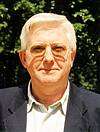Peter Dicken
Peter Dicken (born 1938) is an economic geographer whose research is primarily focused on the processes and patterns associated with globalisation. He joined the University of Manchester in 1966 following the successful completion of his MA from the same institution.[1] He is currently an Emeritus Professor at the same university to which he has dedicated his academic life, continuing his research on global patterns of business and globalisation. His self-described area of research is:
Peter Dicken | |
|---|---|
 | |
| Born | Peter Dicken 1938 |
| Nationality | British |
| Education | MA (Manchester), PhD (Uppsala), AcSS. |
| Occupation | Emeritus Professor |
| Known for | Academic Research into Globalisation |
‘the changing multi-scalar geographies of the global economy and on the structures and dynamics of global production networks, particularly the relationships between transnational corporations and states’.[2]
Career
Throughout his career Peter Dicken has been involved in the following positions:
- Academic at the University of Manchester (1966–present)
- Held visiting academic professorships from universities in North America, Europe, Australia and East Asia.
- Co-director of European Science Foundation – ‘Scientific Programme on Regional and Urban Restructuring in Europe’ (1989–94).
- Consultant advisor to the UNCTAD commission on transnational corporations (1993-4).
- Editorial positions on international journal boards Competition in change, Journal of economic geography, Global networks and Review of international political economy.
- Former managing editor of progress in human geography.
More specifically, Dicken's research areas have involved:
- Global economic geographies of change.
- Trans-national corporation's impacts within the world economy.
- Economic development in East Asia – exploring business networks and production chains.
- Global economic change in different economic scales – involving global to local.
Awards
He was awarded a personal chair in 1988 – an award in recognition his high levels of achievements and standing the research of economic geographies – enabling him professor status. Dicken was awarded the Victoria Medal of the Royal Geographical Society (with the Institute of British Geographers) in 2001 for 'advancing research on globalization and economic geography'. He received an honorary doctorate from the University of Uppsala, Sweden, in 2002. He was also awarded the Centenary Medal of the Royal Scottish Geographical Society in 2007 for 'distinguished contribution to the study of the geographies of the global economy'.
Contribution and Legacy
Peter Dicken's key text 'Global Shift' has sold many tens of thousands of copies over the last 30 years and is his best known and most widely cited work.[1] He has been described as 'one of the most influential economic geographers in the discipline over the last 30 years'.[1] Dicken's fairly uncontroversial approach towards his research is one reason his works remain so popular within the discipline. He was amongst the first to point out the significance of TNCs, providing detailed analysis of their role in the world economy – explaining how they are a barometer for global economic change.
Dicken provided a greater understanding of chains and network structures - in particular by understanding the role, locational behaviour and organisation of Japanese capital and firms in Western economies. His work on the economic restructuring of Japanese firms regarding the Just-In-Time production process is widely cited. Through his work, he was able to explain global economic change in relation to global-local dialect.
Key publications
- "Location in space: a theoretical approach to economic geography" (with Peter E. Lloyd), 1972. (3 editions).
- "Global Shift", 1986. (7 Editions)
References
- Hubbard, P., R. Kitchin and G. Valentine (2005): Key Thinkers on Space and Place. London: Sage.
- SED Website, University of Manchester
External links
| Wikiquote has quotations related to: Peter Dicken |